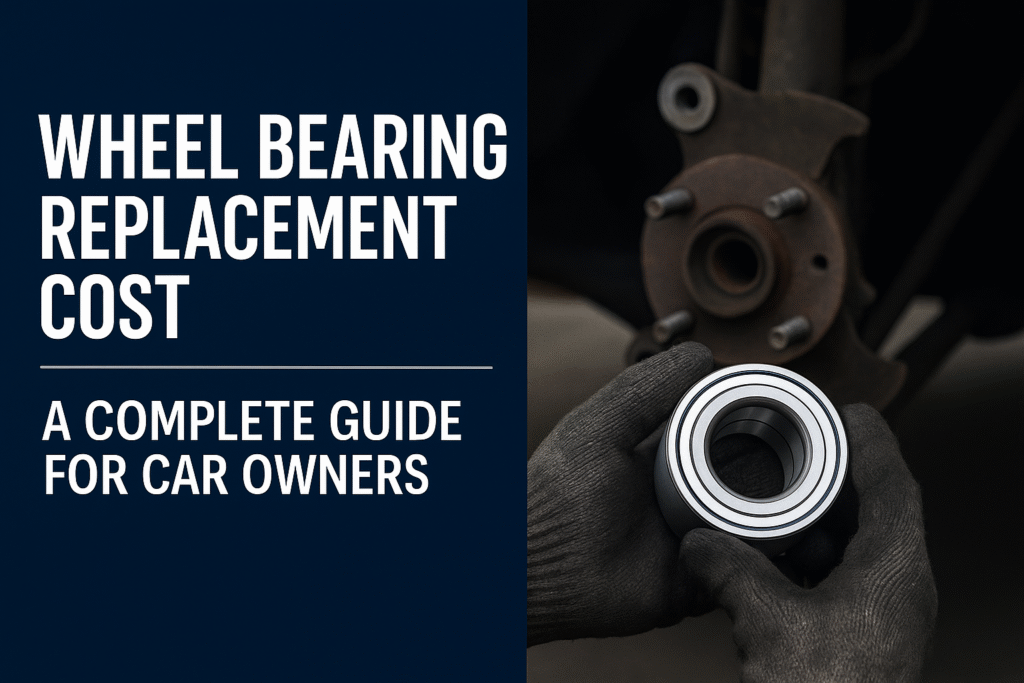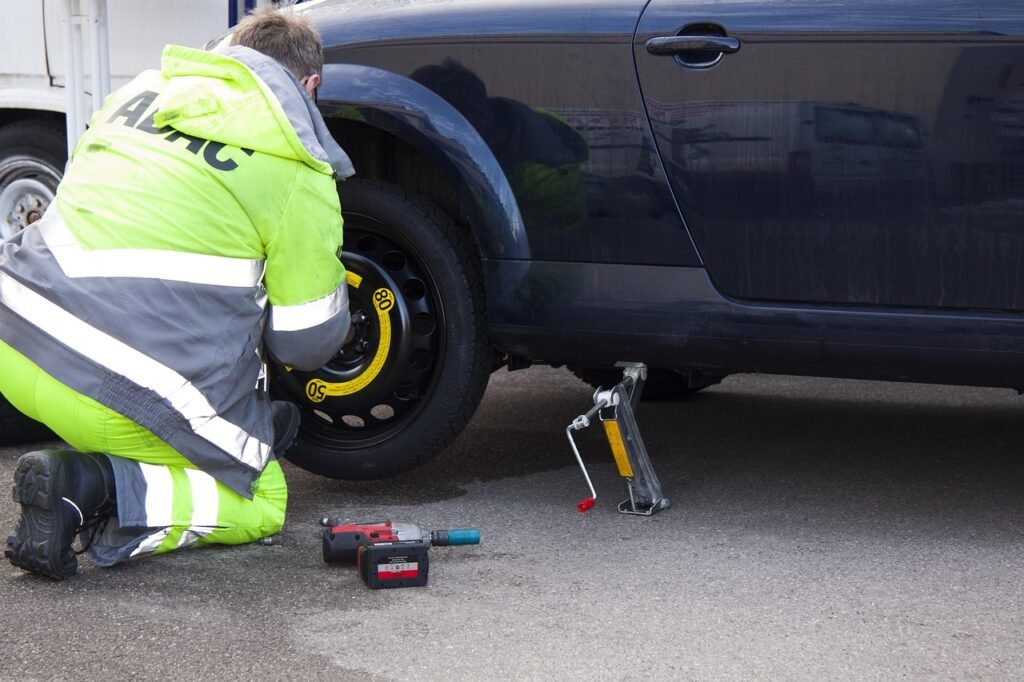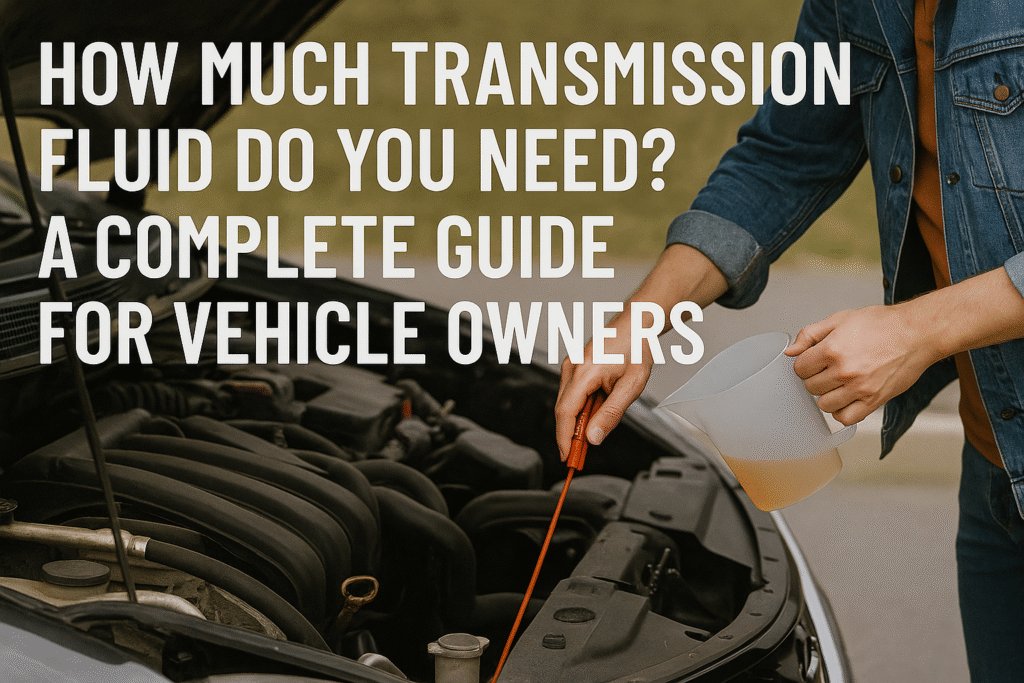A wheel bearing is a crucial component in your vehicle’s wheel assembly, allowing the wheels to rotate smoothly while supporting the weight of the car. Over time, wheel bearings can wear out, causing a range of issues that affect your vehicle’s performance and safety. If its a common issue like having a nail in your tire or even issues related to wheel bearing wear, both of which can lead to costly repairs if left untreated.
In this guide, we’ll break down the wheel bearing replacement cost, explore factors that affect pricing, and help you understand when it’s best to repair or replace your wheel bearings. We’ll also discuss DIY options versus professional repairs, as well as preventative measures to ensure you get the most out of your wheel bearings.
What Is a Wheel Bearing and Why Does It Need Replacement?
A wheel bearing is a set of steel balls or rollers held together by a metal ring, designed to reduce friction and allow the wheel to spin freely. They play a key role in maintaining your vehicle’s ability to turn, handle properly, and support the weight of the car.
Wheel bearings wear down over time due to normal driving conditions, and when they fail, they can cause major issues with the vehicle’s handling, tire wear, and overall safety.
Signs of a Failing Wheel Bearing
Some common symptoms of a bad wheel bearing include:
- Grinding noises coming from the wheels
- Vibrations or unusual shaking, especially while driving at high speeds
- Uneven tire wear or misalignment of the wheels
- Unusual noises when turning, often indicating wear in the wheel bearing
Addressing these symptoms promptly can prevent further damage to the wheel, suspension, and even the axle.
How Much Does Wheel Bearing Replacement Cost?
The cost of wheel bearing replacement varies widely based on factors such as the make and model of your vehicle, labor costs, and whether you choose to repair the part yourself or hire a professional.
Average Cost of Wheel Bearing Replacement
On average, wheel bearing replacement costs anywhere from $200 to $800 per wheel. The final price depends on various factors like vehicle type, location, and whether the repair is done on the front or rear wheels.
Cost Breakdown of Parts and Labor
- Parts Cost: Typically, the cost for the wheel bearing part ranges from $50 to $200 depending on the vehicle model and the brand of parts used.
- Labor Costs: Labor costs typically range from $150 to $400, depending on the complexity of the repair and the mechanic’s hourly rate.
- Total Replacement Cost: The total cost to replace the wheel bearing, including both parts and labor, typically falls between $300 and $1,000.
Factors Affecting Wheel Bearing Replacement Cost
Several factors influence the price of wheel bearing replacement, so it’s important to understand what goes into the overall cost.
Vehicle Make and Model
- Luxury Vehicles: High-end vehicles, such as BMW, Audi, or Mercedes, tend to have more complex suspension systems, and replacement parts for these cars can be more expensive.
- SUVs and Trucks: SUVs, trucks, and four-wheel-drive (4WD) vehicles generally require heavier-duty bearings, which can make the repair more costly.
Location of the Wheel Bearing
- Front vs. Rear Wheel Bearings: Replacing the front wheel bearings tends to be easier and cheaper than replacing rear wheel bearings, especially for vehicles with front-wheel drive.
- All-Wheel Drive (AWD) and Four-Wheel Drive (4WD) Vehicles: These vehicles may require additional labor to replace wheel bearings, as all four wheels may need to be serviced.
Labor Time and Mechanic’s Hourly Rate
- Labor costs depend heavily on the time required for the repair and the hourly rate of the mechanic. For example, complex jobs on certain vehicles may require 3–5 hours of labor, raising the overall price.
- DIY Repairs can significantly reduce the cost but require specialized tools and expertise.
OEM vs. Aftermarket Parts
- OEM (Original Equipment Manufacturer) Parts: These parts tend to be more expensive but are designed specifically for your vehicle model and often come with a warranty.
- Aftermarket Parts: These parts are usually cheaper and offer more flexibility but vary in quality. Some aftermarket parts may not offer the same longevity as OEM parts.
DIY vs Professional Wheel Bearing Replacement: Which Is Right for You?
When dealing with wheel bearing replacement, one of the main decisions is whether to tackle the repair yourself or leave it to the professionals. Both options have pros and cons.
DIY Wheel Bearing Replacement
Costs and Tools
Replacing a wheel bearing yourself can save a significant amount of money on labor, but it requires a good understanding of vehicle mechanics and the right tools. The cost for parts might be $150 to $400, but you’ll need tools like a bearing press, impact wrench, and torque wrench, which can add to the upfront investment.
Time Commitment
DIY wheel bearing replacement can take 4–6 hours, depending on the make and model of the vehicle and your mechanical expertise. Keep in mind that if you make a mistake, it could lead to further damage and additional costs.
Pros and Cons
- Pros: Significant savings on labor costs, learning experience, satisfaction of doing it yourself.
- Cons: Requires specialized tools and experience, potential for mistakes, time-consuming.
Professional Wheel Bearing Replacement
Costs
Professional wheel bearing replacement typically costs $400–$1,000, depending on your vehicle and the complexity of the job. This price includes both parts and labor, and you won’t have to worry about the tools or expertise needed to do the job.
Pros and Cons
- Pros: Professional mechanics ensure the job is done correctly, with warranties and guarantees for parts and labor. Time-efficient and less stressful.
- Cons: Higher cost compared to DIY.
Why You Shouldn’t Ignore Wheel Bearing Issues
Delaying the repair of a bad wheel bearing can lead to serious safety risks and potentially higher repair costs down the road. Here’s why you should address a failing wheel bearing as soon as possible:
Risks of Driving with a Bad Wheel Bearing
Driving with a bad wheel bearing can cause the wheel to seize up or even detach, leading to dangerous situations on the road. It also increases the risk of damaging the suspension or axle, both of which can be costly to repair.
Costly Repairs from Delayed Replacement
If you delay replacing a wheel bearing, it can cause further damage to other components, such as the brake system or suspension, which could increase repair costs significantly. Addressing the problem early helps avoid these compounded repairs.
How to Save on Wheel Bearing Replacement Costs
If you want to minimize the costs associated with wheel bearing replacement, here are a few tips to consider:
Compare Quotes from Multiple Repair Shops
Before committing to a repair, get quotes from multiple auto shops. Prices can vary, and some shops may offer better deals or discounts. Be sure to ask if they specialize in your car’s make and model for the best possible price.
Consider Aftermarket Parts
While OEM parts are more expensive, aftermarket wheel bearings can save you money. However, ensure that the quality meets safety standards.
Regular Maintenance to Prevent Premature Failure
Preventing premature wheel bearing failure through regular tire rotation, proper alignment, and regular inspections can save you from costly repairs in the future.
Conclusion and What to Do Next
Understanding the wheel bearing replacement cost and the factors that influence it is key to making an informed decision about how to address this common vehicle issue. Whether you choose to replace the wheel bearing yourself or seek professional help, taking care of the issue promptly will save you money and ensure your safety on the road.Remember, regular maintenance and prompt action when you notice wheel bearing failure signs can help you avoid costly repairs and keep your vehicle running smoothly.
FAQs
How often should I replace my wheel bearings?
Wheel bearings typically last between 85,000 to 100,000 miles, but this can vary depending on your driving habits, road conditions, and vehicle maintenance.
Can I drive with a bad wheel bearing?
It is not safe to drive with a bad wheel bearing. Doing so could cause further damage to the wheel, suspension, or even the axle, and increase the risk of a dangerous breakdown.



